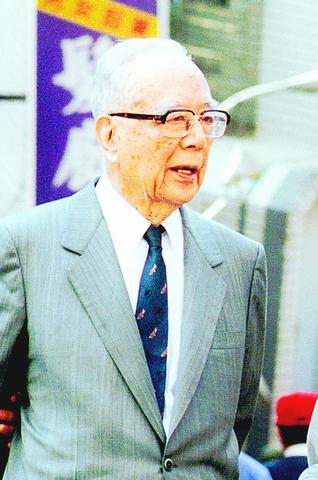Media observers think that the change in leadership at the China Times (
They said that while it is relatively easy to pass on the paper's tangible assets such as stock and employees, the paper's abstract assets will not be so easily inherited.

PHOTO: CHEN CHENG-CHANG, TAIPEI TIMES
"The abstract assets refer to the socio-political relations established by Yu, the profound impact created by the paper's editorials and the great respect the employees have for Yu," said Yu Kuo-chi (
Yu made the comments in the wake of the announcement made on Tuesday that 92-year-old Yu, one of Taiwan's media gurus, is retiring and passing his media enterprise on to his son Yu Chien-hsin (
Yu Kuo-chi said that for a leader of his age, it is natural for Yu to plan ahead while he is still able. But there are obvious disparities between the younger and older Yu, especially in terms of leadership and charisma.
Having growing up during a turbulent era in China and receiving an excellent education at the London School of Economics and Political Science, Yu is intelligent, focused and has an amazing amount of energy and a will to succeed, Yu Kuo-chi said.
"In contrast to his father, the younger Yu grew up in a comfortable environment and is less knowledgeable and devoted."
Those close to the Yu family remain skeptical of Yu Chien-hsin's leadership ability. They viewed this shift in power as an inevitable yet reluctant move.
"When Yu and the senior staff at the paper were engaged in any discussions, Yu Chien-hsin usually stood aside and remained silent. Yu seldom asked for his son for advice," said a senior employee of the newspaper, implying that Yu has doubts about his son's ability.
Media watchers said that as long as the older Yu is alive, his influence at the paper would continue.
"It's sort of a tradition in Asian enterprises that their founders remain influential in their business until the day they die," said a senior journalist, who once work-ed for the China Times.
The China Times, founded in 1950, has been rated one of the three most influential newspapers in Taiwan. Under Yu's management, the paper quickly defeated its rivals in its early years as a result of Yu's successful marketing strategies.
In addition to being a powerful media enterprise, the paper is best-known as a cradle for cultivating prominent journalists in Taiwan. People attribute this to Yu's willingness to help and encourage talented, young journalists.
"Yu is more than willing to offer the young and inexperienced opportunities to express their creativity and follow their ambitions. Anyone with novel ideas and a sharp pen will be treated very well by the China Times," said the journalist.
"However, Yu is also criticized for his cruelty in driving people away when they burned out."
It is a well-known fact that Yu has been the true commander of the paper for the past 51 years. He personally reviews the editorials every day and guides the political direction of the paper.
The journalist said Yu is an influential player in politics, but sometimes his editorials become unintelligible when he tries to please all political parties.

The Ministry of Foreign Affairs (MOFA) yesterday said it is closely monitoring developments in Venezuela, and would continue to cooperate with democratic allies and work together for regional and global security, stability, and prosperity. The remarks came after the US on Saturday launched a series of airstrikes in Venezuela and kidnapped Venezuelan President Nicolas Maduro, who was later flown to New York along with his wife. The pair face US charges related to drug trafficking and alleged cooperation with gangs designated as terrorist organizations. Maduro has denied the allegations. The ministry said that it is closely monitoring the political and economic situation

Conflict with Taiwan could leave China with “massive economic disruption, catastrophic military losses, significant social unrest, and devastating sanctions,” a US think tank said in a report released on Monday. The German Marshall Fund released a report titled If China Attacks Taiwan: The Consequences for China of “Minor Conflict” and “Major War” Scenarios. The report details the “massive” economic, military, social and international costs to China in the event of a minor conflict or major war with Taiwan, estimating that the Chinese People’s Liberation Army (PLA) could sustain losses of more than half of its active-duty ground forces, including 100,000 troops. Understanding Chinese

UNRELENTING: China attempted cyberattacks on Taiwan’s critical infrastructure 2.63 million times per day last year, up from 1.23 million in 2023, the NSB said China’s cyberarmy has long engaged in cyberattacks against Taiwan’s critical infrastructure, employing diverse and evolving tactics, the National Security Bureau (NSB) said yesterday, adding that cyberattacks on critical energy infrastructure last year increased 10-fold compared with the previous year. The NSB yesterday released a report titled Analysis on China’s Cyber Threats to Taiwan’s Critical Infrastructure in 2025, outlining the number of cyberattacks, major tactics and hacker groups. Taiwan’s national intelligence community identified a large number of cybersecurity incidents last year, the bureau said in a statement. China’s cyberarmy last year launched an average of 2.63 million intrusion attempts per day targeting Taiwan’s critical

‘SLICING METHOD’: In the event of a blockade, the China Coast Guard would intercept Taiwanese ships while its navy would seek to deter foreign intervention China’s military drills around Taiwan this week signaled potential strategies to cut the nation off from energy supplies and foreign military assistance, a US think tank report said. The Chinese People’s Liberation Army (PLA) conducted what it called “Justice Mission 2025” exercises from Monday to Tuesday in five maritime zones and airspace around Taiwan, calling them a warning to “Taiwanese independence” forces. In a report released on Wednesday, the Institute for the Study of War said the exercises effectively simulated blocking shipping routes to major port cities, including Kaohsiung, Keelung and Hualien. Taiwan would be highly vulnerable under such a blockade, because it